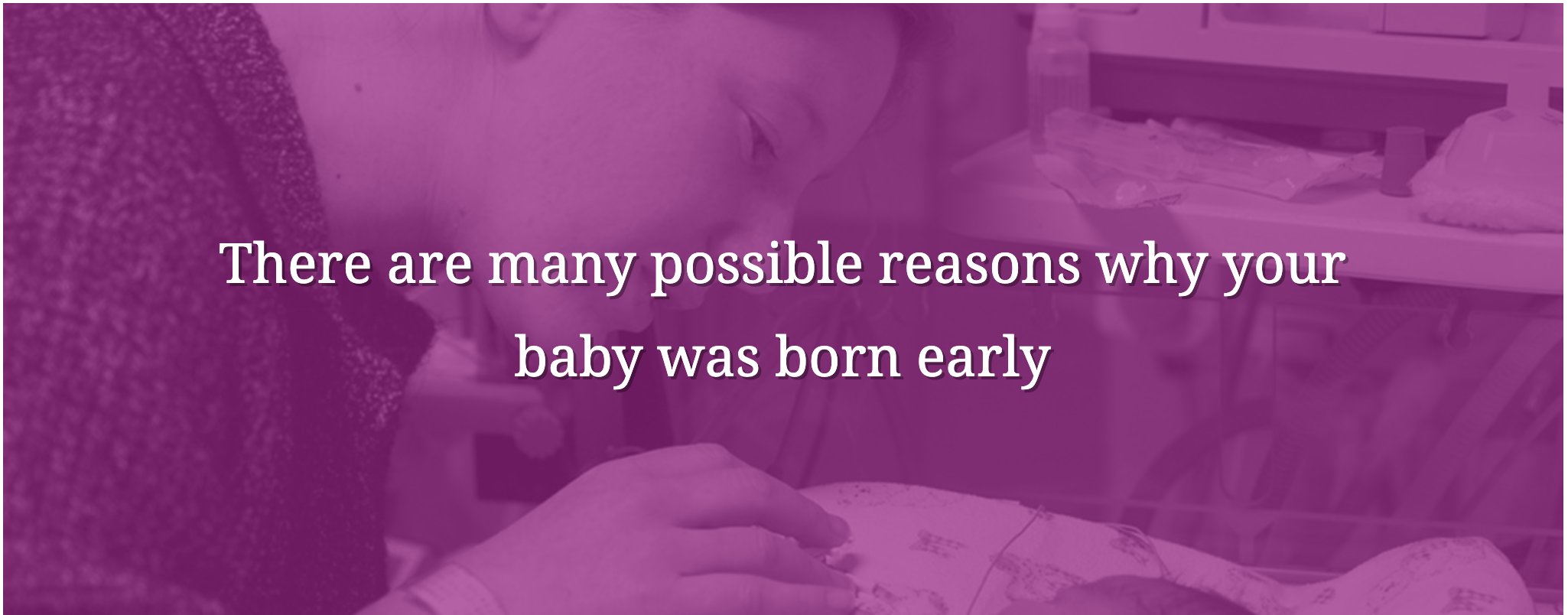Why Your Baby Has Come Early
Reasons why your baby may have been born prematurely
Each year, in Ireland, approximately 5,000 babies are born prematurely, i.e. before 37 weeks’ gestation are completed. Early delivery can be either planned in advanced or unexpected. For approximately 25 – 33 % of preterm babies, there is no obvious reason why preterm delivery occurred. It is nobody’s fault. However, for some babies it is because of a problem with the pregnancy, or a pregnancy with multiples, or the is baby is unwell and gives a signal that it is time to arrive.
If it is expected that your baby will arrive early, every effort will be made to prolong the pregnancy; providing it is safe for mum and baby. However, sometimes these efforts do not help and the baby arrives early.
The exact cause of preterm labour is not known, but we do know that some factors/events do contribute to it. The following health conditions and events may contribute to the preterm delivery of a baby:
• Preeclampsia
• Diabetes
• Pregnancy with multiples
• Infection
• Mother’s age
• Problems with the baby’s development
• Cervical incompetence
• Preterm premature rupture of membranes
• Vaginal bleeding
• Heart disease
• Lack of antenatal care
• Poor nutrition
• Substance abuse
• Kidney disease
• One or more previous miscarriages or pre-term births
• Previous delivery of four or more children
• Short time between pregnancies
• Severe illness of mother
• High level of stress
• IVF or previous fertility treatment
• A traumatic event

Preeclampsia
This is a disorder that affects approximately 10 % of all pregnancies. It affects both the mother and unborn baby. It is a rapidly progressive condition characterized by high blood pressure, the presence of protein in the urine, and fluid retention. It typically occurs in middle to late pregnancy, i.e. onwards from 20 weeks’ gestation.
If you have previously had preeclampsia, there is a 20 % chance that it will re-occur. You are at increased risk of preeclampsia if: you are in your teens or aged over 40 years; obese; this is your first pregnancy; this is a multiple pregnancy, or you have a pre-existing medical condition (www.hse.ie).
Gestational diabetes
Gestational diabetes is a type of diabetes (too much glucose in the blood) that is first diagnosed during pregnancy. An estimation of 12% of all women giving birth have gestational diabetes (www.hse.ie). If it is not detected, it can increase the risk of birth complications, such as shoulder dystocia (when the baby’s shoulder gets stuck during birth), and it may lead to babies being large for their gestational age.
Multiple births
Twin, or multiple, births is one of the more common reasons for an early birth. About one-third of women pregnant with twins will deliver prematurely.
Infection within the uterus or vagina
The presence of certain bacteria in the birth canal is associated with preterm birth and can lead to a preterm birth.
Maternal age
Women aged below 18, or over 40 years of age have an increased risk of early delivery.

Problems with the baby’s development
During your pregnancy you will have received a number of tests to ensure that your baby was growing well without any complications. If a problem was detected, your baby may need to be admitted into the neonatal intensive care unit.
Medical conditions detected in the womb, placenta, or cervix
During your pregnancy you will have been monitored to ensure you were in good health and to ensure your baby was developing as expected. You may have had tests as part of this monitoring. If a problem was detected, an early delivery may have been planned. This may result in your baby being admitted to the neonatal unit to receive special care.
Weakness in the neck of womb (also known as cervical incompetence)
If the muscles at the neck of the womb (cervix) are weak, the weight of the baby can cause them to open. This typically happens in the fourth or fifth month of pregnancy. To prevent the cervix from opening, a stitch (Shirodkar suture) can be tied around the cervix. This stitch is usual inserted at week 14 and removed at week 37. This stitch can be helpful to woman who have had miscarriages due to a weak cervix.
Preterm premature rupture of membranes (Preterm PROM; PPROM)
Premature rupture of membranes (PROM) can occur prior to delivery of a term or preterm baby. PROM occurs when the membrane sac holding your baby and amniotic fluid breaks open (‘waters break’) before you are actually in labour.
Breaking of waters often prompts the onset of labour (24 to 48 hours later). Preterm PORM (PPROM) is when the ‘waters break’ before 37 weeks’ gestation. It can be caused by a bacterial infection in either the mother or baby. Antibiotics are generally given in labour to all women with actual or suspected prolonged rupture of membranes.

